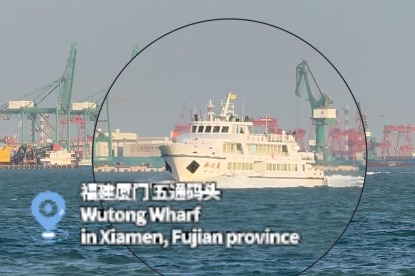'Through a magic door' of life

Motivational speaker and philanthropist details the dangers and elations of his 2006 Great Wall run
Many had tried, none had succeeded. But when Braam Malherbe ran the main intact length of the Great Wall in 2006, it would prove to be much more than a grand adventure, a world's first and a prodigious physical feat. It would also prove to be the world's last, as runs along the wall are no longer allowed.
"The amazing adventure led me through a magic door in my life that otherwise I would never have known was there," he says.
| Braam Malherbe says his run on the Great Wall allowed him to reflect, learn and grow, which was both huge physical and mental challenges. Photos Provided to China Daily |
Today, on the other side of that door, Malherbe's mantras are "the greatest gift in life is giving" and "nothing is impossible if you have big dreams".
In 2005, when Malherbe and David Grier announced their intention to undertake the run, the general consensus among marathon runners, sports scientists and others was: "It's impossible".
Their concerns were understandable. As Malherbe explains: "The Great Wall is a manmade structure lying like a giant sleeping dragon across China's northern frontier. It stretches from Jiayuguan in the west to the Bohai Sea in the east. The harsh climate constraints meant there would be a window of only four months. We had to plan well, physically, mentally and spiritually. We would also have to be exceptionally fit."
To achieve the epic route, he and Grier built up to average training runs in 2006 of 42 kilometers a day, six days a week, from Aug 26 to Dec 15.
"I knew it would be forbiddingly tough, but I didn't know how my journey along this monument to human endeavor and the country would change my life and influence my outlook on just about everything. The Great Wall, in those months of silence, allowed me to reflect, learn and grow. It was a huge and intense physical challenge, but it was just as much a mental challenge," Malherbe says,
On their run, including diversions to reach their support crew, they covered 4,218 km.
"Tortured events, failures, losses seemed to unfold in my mind and resolve themselves one by one. I came back from China a different person. The Great Wall reminded me of what's really important in life: family, loved ones and safeguarding our natural environment."
| Braam Malherbe's book The Great Run is a bestseller in South Africa. |
His pride in being a no-nonsense conservationist is obvious. He rescues snakes and works to save rhinos from poachers. He also educates children and school principals about the environmental future of the planet.
True to his own philosophy, he has evolved into an international motivational speaker, youth developer, TV presenter and philanthropist. His book, The Great Run, is a bestseller in South Africa.
Prior to the run, he and Grier flew to Beijing to consult with William Lindesay, who had journeyed along the Great Wall 20 years earlier and married a local woman. As director of Friends of the Great Wall, a society dedicated to the conservation of the iconic series of fortifications, Lindesay's advice proved invaluable.
Malherbe conceived of the run during a trip to the Gobi Desert, where he realized he would need more than an adventure to achieve his dream.
"It had to be more than an ego thing," he remembers.
As a 16-year-old boy, he had attended a Wilderness Leadership School in the Hluhluwe Umfolozi Game Reserve in Zululand, where a ranger instilled in him his knowledge of the fragility of our planet. Later, as an honorary ranger for South Africa National Parks, he would learn firsthand of the cost of protecting wildlife.
"I had seen a lion in the Kruger National Park with a snare cut deep in his neck, still alive but defenseless as hyenas fed on its hindquarters. I had also seen an elephant paralyzed from a poacher's spinal shot, his tusks hacked out of his head with an axe, his foot slowly scraping at the earth where he lay in his dying throes. The park badly needed money for equipment for its rangers and I wanted to help."
He subsequently ran 620 km from Tsitsikamma Forest in the Eastern Cape to the foot of Table Mountain to raise funds. The run spawned the "Wild Child - Children for Conservation" project that eventually involved more than 10,000 schoolchildren and raised 80,000 rand ($7,000) to support anti-poaching operations.
But for the Great Wall Challenge, finding a credible charity with a good record of success, that also shared his values, was difficult.
"I wanted to involve the natural environment, but corporate social investment programs tend to focus more on people."
He chose to focus on children because, as he notes, they will have little to smile about if we do not address the seriousness of the planet's plight, which he says is caused largely by overconsumption and greed. He then connected with Natalie Miller, who had just launched Operation Smile in China, a global organization that performs corrective surgery on children born with cleft lip and palate deformities.
Finding a sponsor was also difficult. Hundreds of doors were slammed in their faces, Malherbe says, before Jerome Smith of pharmaceutical company Cipla, signed on to become the lead sponsor. Others followed suit. In spite of this, the amount collected was not enough and the two runners and their support team would do without income for five months. Friends eventually sponsored Malherbe's return flight.
"My dad had taught me that faith is believing in something you do not see. The result of that faith is to see what you believed," Malherbe says.
Training started off with running 15 km a day, 90 percent of it on the slopes of Table Mountain. Eventually he was doing this morning and evening and, ultimately, three times a day.
Then disaster struck - a knee injury that required minor surgery. Doctors were concerned. Malherbe says that his attitude at the time was: "Nobody knows my body like I do. I heal quickly and I am positive."
Not even internationally respected sports scientist Tim Noakes thought he would make it. For Malherbe, it was as if a gauntlet had been thrown down before him.
"I could not allow a single seed of doubt to enter my consciousness, so I accepted the challenge like a duel to the death, deep inside myself."
But among the stark realities that Malherbe and Grier did face on the run was the possibility of death.
Preparation included giving a friend power of attorney and Malherbe asking his 17-year-old son Benjamin to name a possible surrogate father. The boy chose Ian MacPherson, whose son Lloyd had died in a skateboard accident two years earlier. Benjamin had introduced Lloyd to the sport and was with him at the hospital when the life support system was switched off.
As Malherbe and his son said goodbye at the airport, the boy gave his father a letter to read on the plane. It told of love and pride and encouraged Malherbe to consider every step taken on the Great Wall as one closer to home and the people who loved him.
On Aug 24, 2006, after more than three years of dreaming and planning, Malherbe and Grier filled a bottle with water from the Great White River to signify the start of the journey, and placed it carefully in a pack. Carrying the Chinese and South African flags, they set off into the unforgiving Gobi Desert.
On Dec 15, 2006, carrying the same flags, they emptied the water into the sea at the other end of the wall. They had achieved the "impossible".
Malherbe remains convinced of his ability to heal, dream and succeed.
"Being successful is great," he explains, "but being significant is greater".
His connection with China continues. He and actor Jackie Chan, who is as keen to save China's tigers as Malherbe is to save South Africa's rhinos, have joined forces.
Asked if we can expect a movie, he smiled enigmatically.
For China Daily
(China Daily Africa Weekly 12/12/2014 page29)
Today's Top News
- Lai's 'separatist fallacy' speech rightly slammed
- Xi's message for New Year widely lauded
- Swiss bar fire kills around 40, injures more than 110
- New Year's address inspiring for all
- Xi congratulates Science and Technology Daily on its 40th anniversary
- Xi congratulates Guy Parmelin on assuming Swiss presidency
































